Interview: True Womanhood (w/ Melissa Beattie, Thomas Redmond)
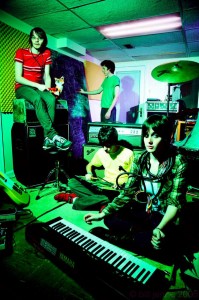 True Womanhood headline at the Metro Gallery today, Wednesday Feb 25. Opening are locals Weekends (whose self-titled, self-released debut recently broke into our Recommended Albums) and Bad Liquor Pond. Doors 8PM/Music 9PM/$7 cover. Don’t miss it.
True Womanhood headline at the Metro Gallery today, Wednesday Feb 25. Opening are locals Weekends (whose self-titled, self-released debut recently broke into our Recommended Albums) and Bad Liquor Pond. Doors 8PM/Music 9PM/$7 cover. Don’t miss it.
Audio clip: Adobe Flash Player (version 9 or above) is required to play this audio clip. Download the latest version here. You also need to have JavaScript enabled in your browser.
MP3: True Womanhood – A Diviner
Audio clip: Adobe Flash Player (version 9 or above) is required to play this audio clip. Download the latest version here. You also need to have JavaScript enabled in your browser.
MP3: True Womanhood – The Gray Man
True Womanhood are perhaps the youngest band emerging from DC at this moment, and certainly one of the most fascinating. They’ve had a blissful and meteoric ascent to favored status amongst a vast majority of DC’s music observers. Their sound is a delightful downer, if there is such a thing, and pretty much stands alone and unique among their regional peers. I took some time to chat with lead singer/guitarist Thomas Redmond and bassist Melissa Beattie about everything they’ve been through and where they are headed.
Aural States: Let’s start with the whole story, from the beginning.
Thomas Redmond (TR): The whole idea of the band came about when it was just me and Ross (Kerr). We were in a previous band that played like 30-minute post-rock (or maybe post-post-rock) extravaganzas. A lot of cool sounds but no structure. It wasn’t bad but got a little boring. We thought “hey, this is some pretty good stuff we’re coming up with…what if we took them and turned them into songs.” Melissa and Noam (Elsner) came in early 2008. Ross and I had the idea in summer of 2007. We did one show just the two of us with acoustic guitars. Then over the winter and early spring we got our line-up formed and some locals behind us to book some amazing shows. Times New Viking, HEALTH…
Melissa Beattie (MB): We’ve all known each other since middle school or high school.
TR: And we were all in the same…everything.
MB: That’s how Thomas met Ross and how we all knew each other.
TR: Ross, Noam and I all played the clarinet in the school band at Walter Johnson.
AS: Other than the post-rock group, did you guys have any other previous experiences creating music?
TR: Not really. I think for Melissa, this is her first music-making experience.
MB: You think?
TR: I know.
MB: Yeah, I only started playing an instrument a little over a year ago.
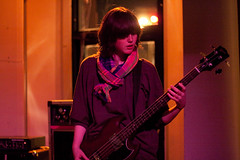 AS: So then how/why did you get recruited into the band in the first place?
AS: So then how/why did you get recruited into the band in the first place?
MB: I was supposed to take pictures! But really, we had all just hung out a lot and Thomas and Ross always liked my taste in music. So they were like “Oh you should probably learn to play an instrument!” So I did. Thomas started teaching me on a fretless bass since it was the only thing he had around. And I got really frustrated with that!
TR: But she’s really taken off with it since then. It was obvious to me that she would be good at it because she clearly has that musical ear. At first, she was frustrated I think…
MB: Well yeah, on a fretless bass my friend!
TR: That and it was also like “Well, we’re going to start doing shows next week.”
MB: I’m also really lucky to be in a band with Thomas, Ross and Noam. They’re patient and good teachers.
AS: Could you talk a little about the name, True Womanhood.
TR: It came from a cult that’s not really a cult…
AS: Cult of Domesticity.
TR: Yeah, from the 19th century. They had really rigid guidelines for what women were supposed to do, how they were supposed to act and what they should to aspire to. Obviously we don’t agree with any of those rules, really…
MB: I thought you thought it was just a cool name.
TR: Well it is a cool name! It looks good. *proudly unveils new t-shirt design* It conjures up a cool feeling. It adds a mystique to the band. I think everyone really likes it; before we even played a show or had any music up on the Myspace, people were interested just based on the name.
AS: Any awkward comments since Melissa is the only female bandmember?
TR: There was actually this guy who came on our Myspace and claimed we were gender blackfacing! I thought: “Dammit, if we didn’t have this name for so long, we would’ve been called Gender Blackfacing!” *laughs*
MB: It’s mostly from our parents or their friends.
TR: Anybody who would be more literal with the name than that, I don’t think it matters to them after they hear our music.
AS: On your demo, were the songs already written or did you go into writing/recording mode?
TR: Let’s see. ”The Monk” was completely different.
MB: It sounded a little like Neil Young.
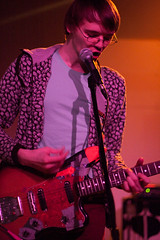 TR: That’s why we used to call it “Neil ‘Fuck Ross’ Young.” When we started recording it, I was really unhappy with my guitar part, so we proceeded to rip the song to shreds. We liked the drums, the bass. Ross had a good melody but the sound wasn’t there. The vocals changed a lot too since it was a new song. We found the right sound for Ross’ guitar. The reverse gate, which is the Kevin Shields’ effect (My Bloody Valentine). It’s completely overused, and if you hit it with those big chords you end up sounding like MBV. But what Ross is doing is a delicate picked part so it sounds like…I don’t even know. It’s kind of like a cascade of guitar, but people even thought it sounded like a violin…
TR: That’s why we used to call it “Neil ‘Fuck Ross’ Young.” When we started recording it, I was really unhappy with my guitar part, so we proceeded to rip the song to shreds. We liked the drums, the bass. Ross had a good melody but the sound wasn’t there. The vocals changed a lot too since it was a new song. We found the right sound for Ross’ guitar. The reverse gate, which is the Kevin Shields’ effect (My Bloody Valentine). It’s completely overused, and if you hit it with those big chords you end up sounding like MBV. But what Ross is doing is a delicate picked part so it sounds like…I don’t even know. It’s kind of like a cascade of guitar, but people even thought it sounded like a violin…
My guitar part went from a Neil Young, only picking down, not giving a fuck thing to an eigth-note, more intricate thing. A lot of people think that’s a Rhodes piano but it’s just a guitar through a really nice tube amp.
“A Diviner” is pretty much done, we’re just trying to get it to sound as nightmarish as it can. Both “The Monk” and “A Diviner” are going on the EP.
The story of the demo is we realized “Oh shit, we need to have something on our Myspace more than live recordings. Let’s buy the cheapest mics and recording equipment we can find on Musician’s Friend.” There were no mics used on the demo that cost us more than $50. We recorded in my living room, with the mics running into an interface to my computer. It was done in a week.
MB: I’m glad we did it that way. We were all nervous to record and I’d never played an instrument before and none of us had ever recorded before.
TR: And then we didn’t really need to worry about time or money. But with the EP I think we want to get sound with more personality. It’s hard to get a good bass sound without taking a lot of time, using compressors and my knowledge of all that stuff is pretty slim. Our, I guess he’s the producer, is the sound engineer for A Place to Bury Strangers, at Death By Audio in Brooklyn. He’s fresh off the NIN tours and he’s got so much experience. And he actually went to our high school too!
AS: Did you find taking the quicker approach to the demo was really beneficial for you early on?
TR: Yeah, we actually got a disproportionate amount of positive feedback for the amount of time we put in. And it’s really helpful since I think the whole point of our band is to have the experimental side and the pop side, and resolve those two in the end. A lot of times, when people see us live they are more hung up on the visual of us banging on weird stuff. When we hand them the demo they say: “Hey, these are good pop songs too!”
AS: The mood of the demo is darker, a bit macabre. Was this intentional, by track choice, or is that just where you always dwell?
TR: I’d say a lot of our music is darker, or a little depressive. That might just be the nature of the four people in the band.
MB: We’re just sad cases.
AS: So you don’t think you’re sitting on any saccharine pop gems?
TR: We actually have a couple now that are coming along! We played one of them once, live. It felt kind of weird. We’re kind of embarrassed because right now it’s just called “Pappy.” It’s just the working name. It’s kind of like if you took a Smiths song and had the guitars be more MBV-ish…not to be that specific of course. Just a nice little pop song with some crazy sounds and a really good bass line. But even that song is depressive, I’d say.
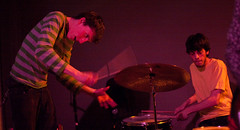 AS: You mentioned you got a lot of really positive feedback in what was actually a pretty short amount of time. What was that like? Did it leave you a little shell-shocked at first?
AS: You mentioned you got a lot of really positive feedback in what was actually a pretty short amount of time. What was that like? Did it leave you a little shell-shocked at first?
TR: We’re probably still pretty shell-shocked. It’s great to be recognized for something that you’re doing and care a lot about. We’ve been pleasantly surprised and grateful that people genuinely like our music. We’re not connected in any way, to anybody, when we started out. The way Ross and I got that first gig was through a friend of a friend who said “You should talk to Scott at Velvet Lounge!” And that was only a year ago. Now, tons of people are coming out of the woodwork offering to help. It’s really great, especially in a city that’s not really known for that kind of thing. It is also a little bit intimidating.
AS: I think over the span of a week you guys made the rounds, getting interviewed or featured by nearly everyone who writes on music in DC. Did you or do you worry about overexposure and saturation and the attendant problems?
TR: I’d say so. It’s not a good feeling to have backlash when you haven’t even released anything or played in the double digit numbers of shows.
MB: Yeah, we like the demo and all but it’s hard when people judge on a demo that we pretty much put together in a week. We find ourselves saying “No no, but we really do have more to offer!”
TR: The purpose of the band is also beyond here, we’re not looking at just what we can do in DC. We’re trying to situate ourselves more on the East Coast and some sort of music scene at large, not just in DC. That’s what is great about how fast stuff is going: we can be from DC without being strictly a DC band that’s been playing here for 3 or 4 years. And now we can release an EP to some amount of attention.
To be fair, we did play 2 or 3 years worth of shows in a year. We’re playing so much so the risk of overexposure is there but we’re trying to mix up what we’re doing and bring a lot of different instrumentation in so that it’s not your ordinary 4-piece band. That helps us a lot because we can be visually stimulating as well as musically. And I think this will buffer us from some of that criticism until we grow into our own live potential.
AS: As kind of a parallel to your desire to not be saddled with only being a DC band, how do you feel about some of the lofty comparisons that have been thrown out there and come with high expectations. I know Sonic Youth was bandied about a lot early on, and I mentioned Radiohead.
TR: Well, anytime someone’s made comparisons, it’s always been positive. But let’s start with Sonic Youth because that’s an easy one to perforate. I have every Sonic Youth album; I am obsessed with that band, or I was at some point. But we don’t sound like Sonic Youth. Our attitude and our mood is completely different. We use noise guitars at times, when it suits us. There’s an obvious…
MB: …visual thing going on. Female bassist, lanky singer.
TR: There definitely are things that you can be like “Oh Sonic Youth once played noise guitar.” But that one’s just too easy. What’s the second biggest experimental rock band we know? Answer: Sonic Youth. What’s the biggest? Oh, Radiohead. There is pressure to escape that. The least cool thing you could do is try to sound like Radiohead and end up with Keane. I feel like in mood, that one is more apt than Sonic Youth. But we’ve definitely got our own vision that doesn’t line up with theirs.
I’d say, if you are going to compare us to someone, why not No Age or Beach House? I can hear both of those influences just as easily. To be honest, we’re really invested in the new bands that are coming out, and that’s what we want to be a part of. Defining what’s happening now and not rehashing what happened before.
The one thing we’ve probably got most in common with Radiohead is our desire to be a pop band that incorporates avant-garde elements. I think there’s also an obvious Björk thing going on. Ultimately, though, we’re not that concerned.
AS: You mentioned that you want to be more associated with things going on now, rather than attached to something in the past. You are also pretty young, still go out to a lot of shows and are involved with the same social set that looks at you critically. How does that affect your experience?
TR: It’s definitely weird. We’re young and naive, but we’re not too naive to realize that these people who, on the face of it, are our friends also affect how our band will be taken. Whether or not we’ll get a chance to go farther. So it does get weird because you want to be judged on your merits solely, but that’s not reality. Luckily everyone’s been really genuinely nice and the people who haven’t have done it anonymously.
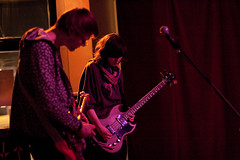 AS: In line with this, the environment you have to play in, being in and from DC, you’ve got a lot of legacy to deal with. A lot of older musicians hang around with a lot of pull around town. There’s definitely a burgeoning movement of new artists between you, Imperial China, Caverns, but you are definitely the youngest. What do you feel is your connection to all of this?
AS: In line with this, the environment you have to play in, being in and from DC, you’ve got a lot of legacy to deal with. A lot of older musicians hang around with a lot of pull around town. There’s definitely a burgeoning movement of new artists between you, Imperial China, Caverns, but you are definitely the youngest. What do you feel is your connection to all of this?
TR: In terms of band age, those two are a little older than us. But I think it’s pretty easy for us to play because, aside from geography, we have no connection whatsoever to Dischord or any of that stuff. In terms of an actual connection it feels like right now, Dischord’s legacy in DC is strongest in the memory of people who are writing. DC actually feels kind of like blank-slate right now, not completely, but definitely confused. Not in a bad way. There’s no main movement. It’s frustrating in one sense, but we can do whatever the hell we want and stand out for it and not get smothered. Our band wouldn’t have had the same reception in Baltimore or Brooklyn early on. While still trying to find what we sound like (we still are). It’d be so easy to say: “Oh this is a blah-blah rip-off,” or “This other band is crazier; they do crazier stuff like pee in each other’s mouths.”
MB: I’ll admit it would be nice to have a scene to build you up and insulate you.
AS: Are there any DC artists right now that you would claim musical kinship with? Maybe Deleted Scenes?
TR: I think that’s one of a very short list.
MB: But it’s not like we don’t love playing with everyone in DC.
TR: Yeah, that one concert we did with Imperial China and Caverns was probably the most interesting DC locals show in a long while. Maybe in years. Obviously we have a different sound and approach from both. We’re all doing our own thing. I said before there’s really no movement, but there is. It’s extremely introverted. Big grindcore and underground punk scenes still going on. That’s the most close-knit, solid musical scene you can point to in DC right now. But I feel like our sound isn’t tied to any particular city or scene quite yet.
AS: How did you know the time was right for you to record the new EP?
TR: We’ve got tons of material that’s just waiting to be recorded. Way more than we have time to work out to play live, let alone record. We’re all holding down full-time jobs while this band is quickly becoming like another full-time job.
AS: So let’s stop and talk a little bit about your songwriting process. It sounds like you juggle a lot of songs at once?
TR: Well we have a giant blackboard in our practice space with 60 songs in various stages of completion…
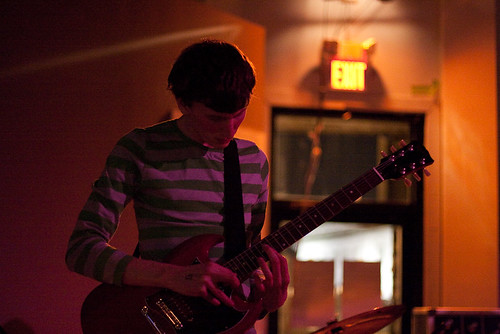 AS: Do you ever worry that people will see the big board?
AS: Do you ever worry that people will see the big board?
TR: *laughs* We have this crazy, really sick key. It’s twisted, with 50 different symbols that mean different things. That way we can track our progress. We’ve got probably 20-30 that are ready to be recorded. We picked 6 that felt best represented us now, with the most momentum behind them and that we felt strongest about creatively. Right now, we’re experimenting with a lot of samplers so I tried to incorporate some of that. That’s been changing the way we’ve been writing songs and how they have been progressing. Now we’re thinking about how can we find sounds and plug them in the right places.
AS: Where is the majority of the song-writing burden? Is it pretty democratic?
TR: I guess generally, I’ll come up with a progression or a series of parts that are very barebones. Sometimes, it’s even just an idea of the emotional track that a piece of music will go on. Everyone will attack it and rip it apart and add on to it. A lot of the percussive sounds and weird noises come from the fact that my basement is full of junk. So at any given time, there are tons of things on hand that we can pick up at any point during a song.
I think that our openness to different sounds, as well as our openness to different feelings, coming from different places. Like instead of power chords where the bass must play root notes, the bass might come in with completely different feeling and let them either resolve or not. So it starts out with that structure, that gets completely obliterated and then sewed back together.
AS: So are lyrics an after-thought? The music sounds like it can take a lot of time to develop.
TR: They’re definitely not an after-thought. But in most cases I think lyrics take the most time to get right, and suffer the most when you’re working a 9-to-5. The words require full thought and you can’t just store a nice little tune in your head and try it out on guitar later. You have to devote your full attention to it, so they usually come later.
AS: Do you find yourself using a lot of themes related to the name? In the demo, you can find some of the virtues of the Cult of Domesticity explored…piety and purity I think in particular with “The Monk” and “A Diviner.”
TR: That’s interesting because I’ve actually never thought about it that way. I think more than anything that shows how creative the name True Womanhood is, the depth it lends to the music. Recently I’ve been interested in people trying to reconcile the existence of God with mounting evidence against God, from the 1700s continuously to this day. That kind of stuff is coming up a lot. The two tracks you mentioned, the new one “Magic Child.” I think those sort of things are also really great at setting moods. Like I said before, a big part of this band is setting emotional tracks, songs that take you somewhere as opposed to just a collection of bursts of energy.
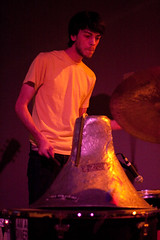 AS: Where’s the new EP going as far as tone, sound and lyrics?
AS: Where’s the new EP going as far as tone, sound and lyrics?
TR: We’re trying to show off more of our potential. That we can do stuff that’s not 130bpm.
MB: You can tell we’ve been in the recording studio…
TR: Yeah, now we know the bpm of all our songs. The jazzyness is going to come out. I use a lot of jazz chords this time around, but you might not necessarily be able to tell. It’s not in a showy way, but instead it sets up different moods that wouldn’t be available to power chords or MBV-style chords with the drone-y notes. We’re definitely getting better at hiding influences. We have one song, its working name is “Dignity Colony” where Ross plays a sampler, Noam plays a go-go beat and Melissa plays this amazing, indescribable bass line. If you come to the show, you’ll see it.
Something that our producer said to us that I thought was really cool: “I can hear the Joy Division influences, but they’re completely different from the influences of 5 years ago.” You know, where bands like Interpol went with that disco beat, the real sparse guitar and low voice with reverb. Joy Division is another one of our huge influences. Their whole attitude towards making music. They got really lucky in that they embraced their amateurishness. That made them extremely open to a bunch of different sounds. And they were probably manipulated by Martin Hannet in the studio.
I think right now what’s going is that there’s really unique sounding music being made from using samplers in an obvious way, as opposed to hiding the fact that you’re using them. Like Animal Collective or Growing, where you know what they’re doing, saying: “This is a musical instrument too.” The sounds that I recorded on the bus today can be used in a musical way. That kind of goes back to Krautrock and Faust’s first album, and I think we’re trying to see what we can do and what we want to say with those ideas.
AS: What about your live show? How have you been finding that maturing?
TR: As a band, we’re not that interested in playing traditional rock clubs with brick walls and velvet curtains. Cool spaces bring so much to our music since a lot of it is about mood.
MB: I think that’s one of the reasons why people liked our Velodrome dance party at Civilian Art Projects so much…because it is an art gallery. That’s what’s so cool about Baltimore, where you can be playing all these amazing, interesting spots.
TR: And one thing that kind of sucks about our band is that we’re pretty ambitious with our instrumentation. Sometimes it’s hard to capture that sound in certain spaces. What we want to start doing is the Dan Deacon thing, setting up on the floor and having everyone around us. I think we’re gonna have to start doing that on these small stages like DC9. The most obvious thing about our live show is that it’s gotten better. When we started we were really nervous performers, jittery. For those first performances, having to go somewhere and actually make it all happen. The technical aspect is a headache.
Now we’re more comfortable and not worrying all the time that something’s going to cut out or go wrong. That’s allowed us to actually perform a little more.
One guy who’s seen us multiple times commented that we’re starting to get better control over the experimental aspects of the music, so now it’s not like two different bands on the same stage. That’s starting to come together and make more sense. Less discordant, which is a dangerous thing to say in DC.
MB: And I think we really just feel more confident that we can pull it off, at least in my case.
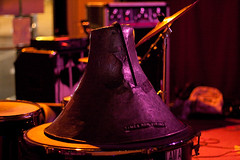 AS: Have you considered adding any other aspects to the live performance? Audio visual or…
AS: Have you considered adding any other aspects to the live performance? Audio visual or…
TR: Definitely! We had ribbon dancers at a show. Really bizarre. DC doesn’t like them at all.
MB: It pissed off everyone. A couple people came up to us after the show and said “I really liked your show but the ribbon dancers were just really messed up.”
TR: People shouldn’t dance at all, let alone with ribbons!
MB: Projections could be cool but they may be a little over done. So we’d really have to think about it.
TR: We put so much effort into finding unique sounds in the music, if we just slapped a projection screen up with psychedelic colors or a lava lamp, it would just be wrong.
MB: Videohippos does it really well though.
TR: Yeah, they put a lot of time and effort into their projections. I’ve actually got a DVD of their backscreen that Kevin gave me. But it’s tough, especially in small spaces, it’s tough to feel right doing something out there in that sort of space. It sort of railroads you, every band that goes up on stage there looks pretty much the same. Whereas in like an abandoned mill like in Baltimore…
We have a disassembled pipe organ we’ve been using as an instrument. Huge wooden pipes, the tallest of them are like 4 feet tall. We’ve got like 40, and mic each one and pitch shift them so each makes a different sound. We’ve been thinking of ways to incorporate them into the live show, so it’s not just 4 people standing there with guitars. More aggressively showing that we’re not using typical instrumentation. But even that, the limiting factors are the size of the stage, size of the van, the patience of the sound guy…
But that’s why the plan is to get really really big so everyone has to do what we say. That’s the rule. We have to get as big as we can, as fast as we can, so we can do crazy shit. Until we get there, no one would put up with it.
AS: So you would abandon all of your day jobs to pursue music full-time?
TR: Yes. Absolutely.
MB: It’s such a bummer working a 9-to-5 and have all these creative ideas that you can only hum the melody until you’re home.
TR: We’ve got so much stuff that just gets forgotten or put on hold. It’s pretty obvious that we all want to pursue creative things as fully as possible.
AS: That’s interesting because I feel a lot of people would answer otherwise. That many people don’t want to give up their careers or their music.
MB: I think that’s why there isn’t a bigger DC music scene. People have very professional white-collar jobs here. Why would you give up making $70 grand a year at your cushy job and take a chance.
AS: I guess to close out then, what are your dream labels and dream artists to work with?
MB: We really like bands like Deerhunter, Beach House, Animal Collective. We think those bands have some of the same ideas for where we’re taking our music.
TR: Right now, as far as labels, in DC Paw Tracks and Carpark are really interesting to us. There’s cool stuff coming out of Slumberland, like The Pains of Being Pure at Heart and Crystal Stilts (who we’re playing with). Beyond that, XL who probably have the coolest variety of musicians of any label. Santigold, Dizzee Rascal, Vampire Weekend, Titus Andronicus. That’s the kind of label we’d love to work with since we don’t see ourselves as a rock band. We could easily come out with an ambient piece.
Related posts
- One Track Mind: True Womanhood – “Dignitas”[Audio clip: view full post to listen] MP3: True Womanhood...
- True Womanhood @ the Black Cat (2008.10.27)All photos: Jane Briggs [Audio clip: view full post to...
- Aural States Fest II: Spotlights – Office of Future Plans, True WomanhoodPhoto credit: Pete Duvall Office of Future Plans are, in...
- Photos: True Womanhood, Weekends, Bad Liquor Pond @ the Metro Gallery (2009.02.25)All photos: Greg Szeto Bad Liquor Pond Weekends True...
- Photos: True Womanhood @ the Hexagon (2009.10.17)...





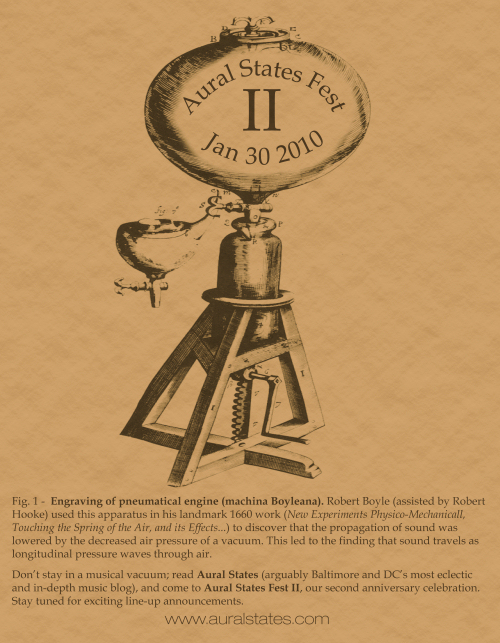
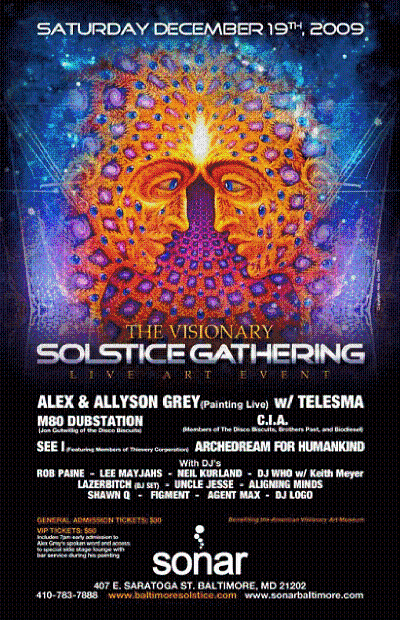









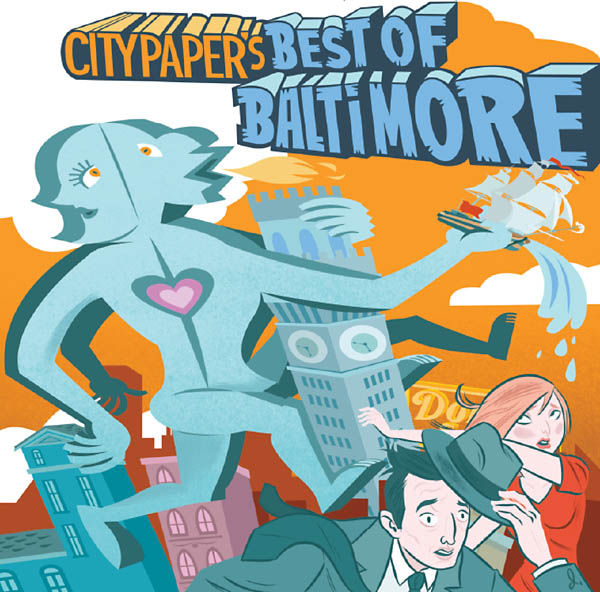
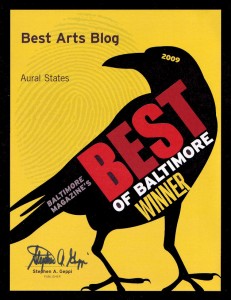


 Double Dagger: Masks EP
Double Dagger: Masks EP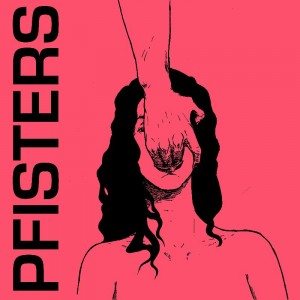 Pfisters: Narcicity
Pfisters: Narcicity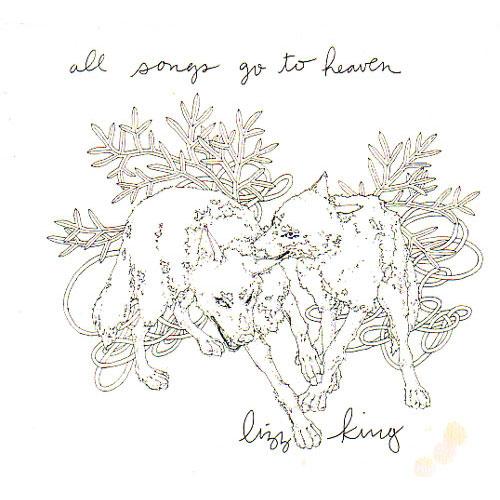 Lizz King: All Songs Go To Heaven
Lizz King: All Songs Go To Heaven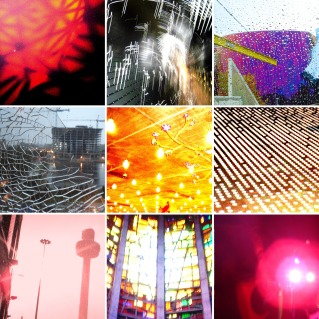 Imperial China: Phosphenes
Imperial China: Phosphenes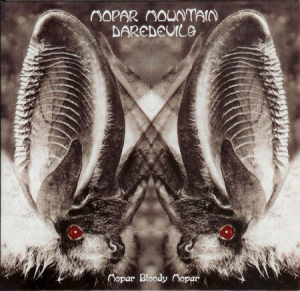 Mopar Mountain Daredevils: Mopar Bloody Mopar
Mopar Mountain Daredevils: Mopar Bloody Mopar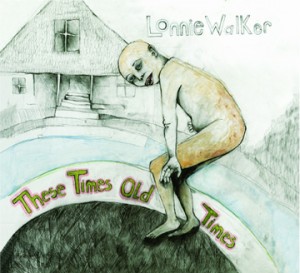 Lonnie Walker: These Times, Old Times
Lonnie Walker: These Times, Old Times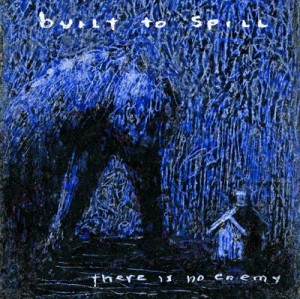 Built to Spill: There Is No Enemy
Built to Spill: There Is No Enemy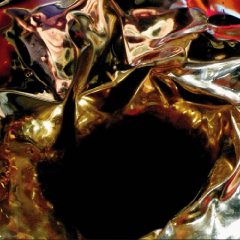 Hypnotic Brass Ensemble: Hypnotic Brass Ensemble
Hypnotic Brass Ensemble: Hypnotic Brass Ensemble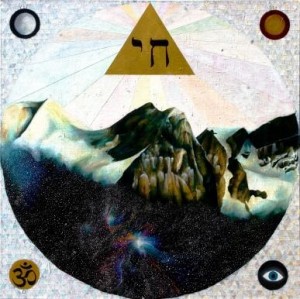 Secret Mountains: Kaddish EP
Secret Mountains: Kaddish EP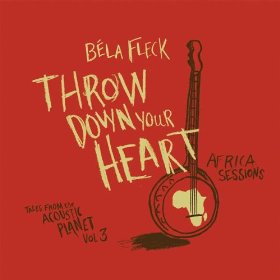 Bela Fleck: Throw Down Your Heart: Tales From the Acoustic Planet, Vol. 3 -Africa Sessions
Bela Fleck: Throw Down Your Heart: Tales From the Acoustic Planet, Vol. 3 -Africa Sessions Lands & Peoples: Lands & Peoples EP
Lands & Peoples: Lands & Peoples EP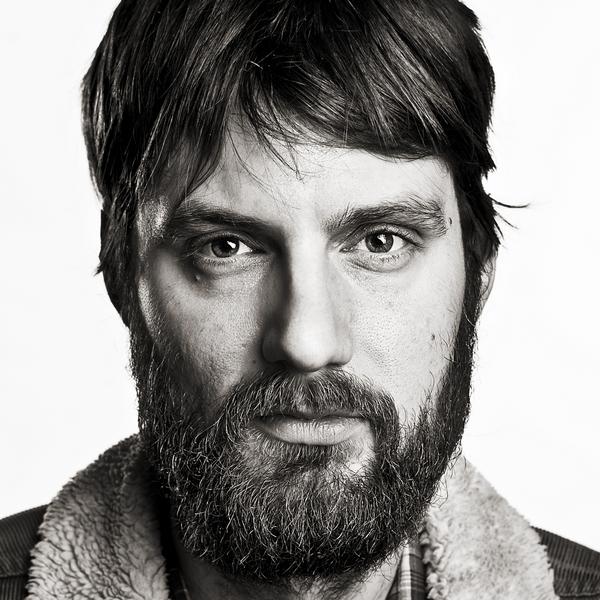 Caleb Stine: Eyes So Strong and Clean
Caleb Stine: Eyes So Strong and Clean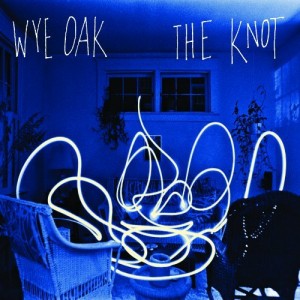 Wye Oak: The Knot
Wye Oak: The Knot Pontiak: Maker
Pontiak: Maker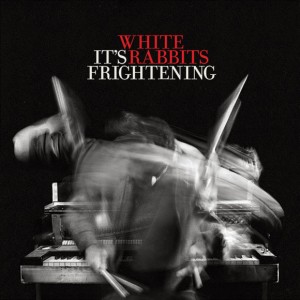 White Rabbits: It's Frightening
White Rabbits: It's Frightening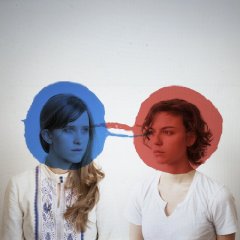 Dirty Projectors: Bitte Orca
Dirty Projectors: Bitte Orca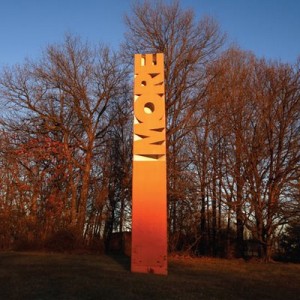 Double Dagger: More
Double Dagger: More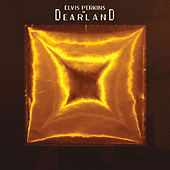 Elvis Perkins in Dearland: Elvis Perkins in Dearland
Elvis Perkins in Dearland: Elvis Perkins in Dearland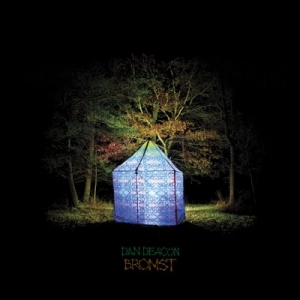 Dan Deacon: Bromst
Dan Deacon: Bromst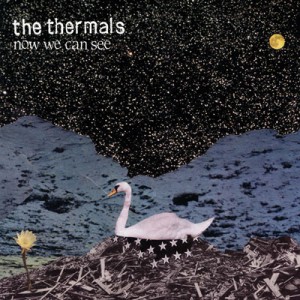 The Thermals: Now We Can See
The Thermals: Now We Can See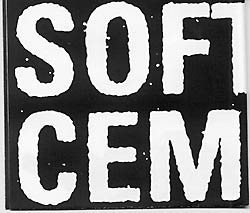 Soft Cement: Think About It EP
Soft Cement: Think About It EP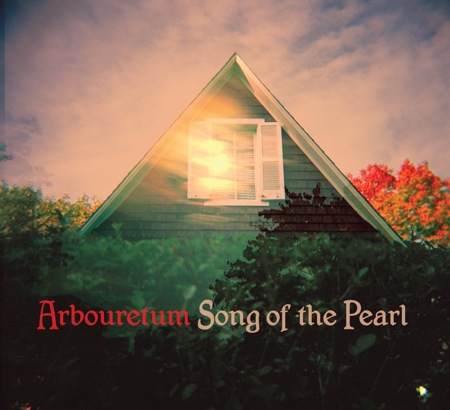 Arbouretum: Song of the Pearl
Arbouretum: Song of the Pearl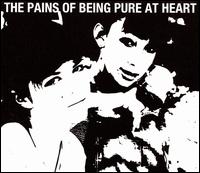 The Pains of Being Pure at Heart: The Pains of Being Pure at Heart
The Pains of Being Pure at Heart: The Pains of Being Pure at Heart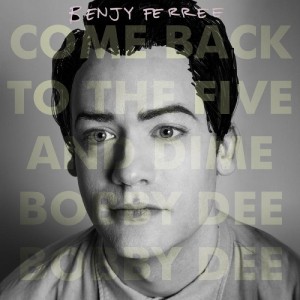 Benjy Ferree: Come Back to the Five and Dime, Bobby Dee Bobby Dee
Benjy Ferree: Come Back to the Five and Dime, Bobby Dee Bobby Dee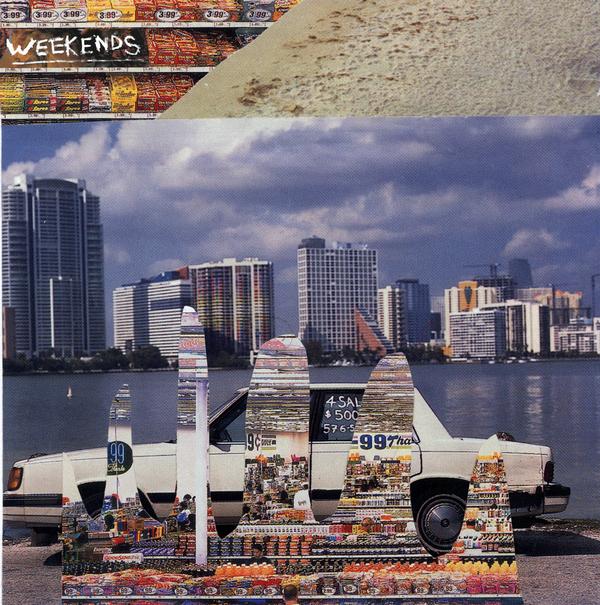 Weekends: Weekends
Weekends: Weekends Height With Friends: Baltimore Highlands 12" LP, Limited-Run Vinyl Only
Height With Friends: Baltimore Highlands 12" LP, Limited-Run Vinyl Only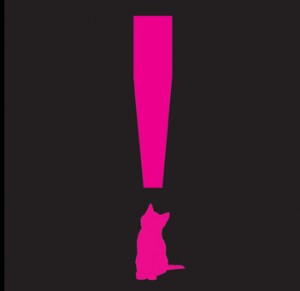 Caverns: Kittens! EP
Caverns: Kittens! EP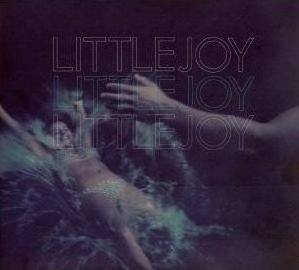 Little Joy: Little Joy
Little Joy: Little Joy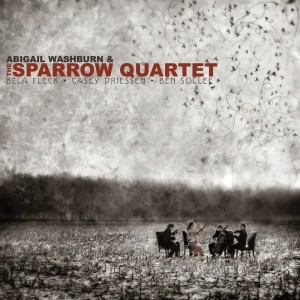 Abigail Washburn & the Sparrow Quartet:Abigail Washburn & the Sparrow Quartet
Abigail Washburn & the Sparrow Quartet:Abigail Washburn & the Sparrow Quartet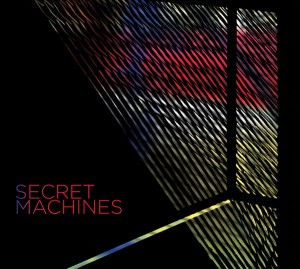 The Secret Machines: Secret Machines
The Secret Machines: Secret Machines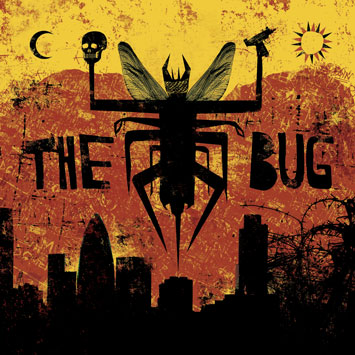 The Bug: LondonZoo
The Bug: LondonZoo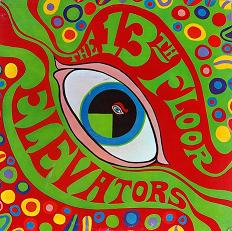 13th Floor Elevators: Psychedelic Sounds of the 13th Floor Elevators (Vinyl Mono LP only)
13th Floor Elevators: Psychedelic Sounds of the 13th Floor Elevators (Vinyl Mono LP only)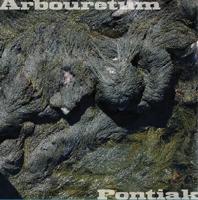 Arbouretum/Pontiak: Kale (Vinyl LP only)
Arbouretum/Pontiak: Kale (Vinyl LP only) Small Sur: We Live in Houses Made of Wood
Small Sur: We Live in Houses Made of Wood AbeVigoda: Skeleton
AbeVigoda: Skeleton ImperialChina: Methods: EP
ImperialChina: Methods: EP
wow….thanks for the great interview greg and true womanhood. just the other day i was listening to them and thought “man i need to find out more about this group!” Then POOF! you put up this terrific piece. Nice.
Their show a year or two back put me off, maybe that’ll change.
these guys are great for the dc scene, for teh reasons they stated above…they’re not doing the indie-pop thing that most bands in dc are doing. i hope they stick around.